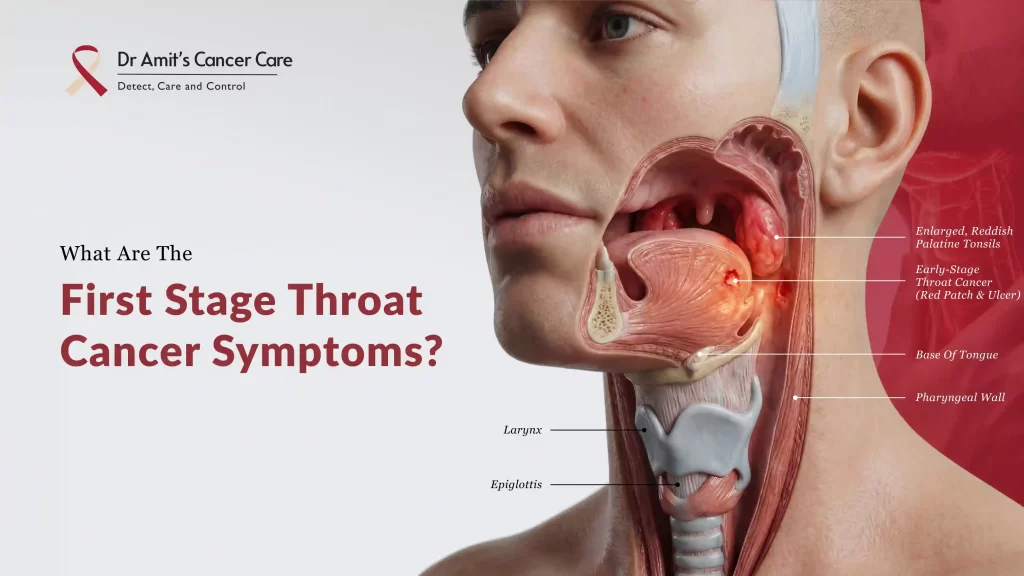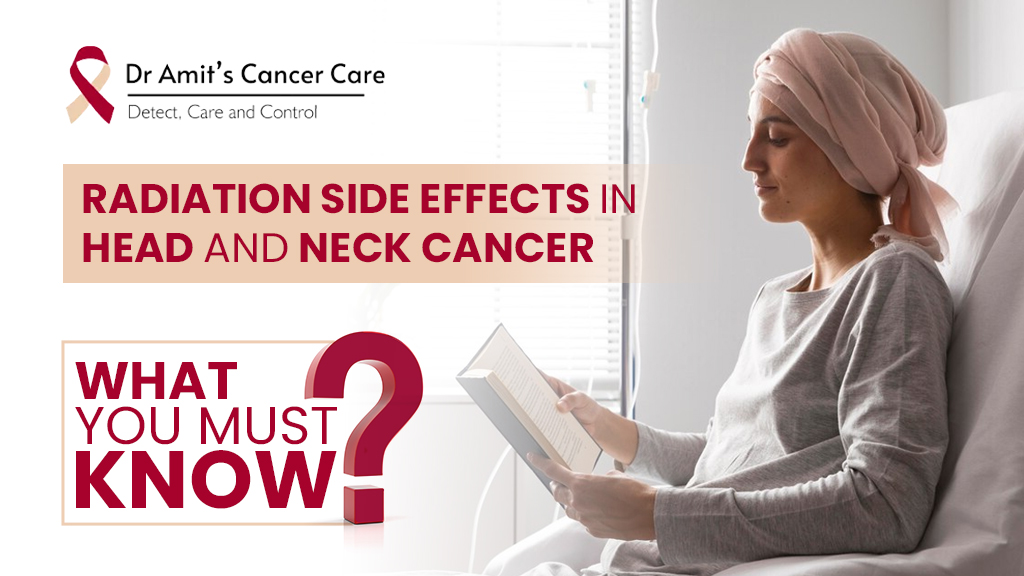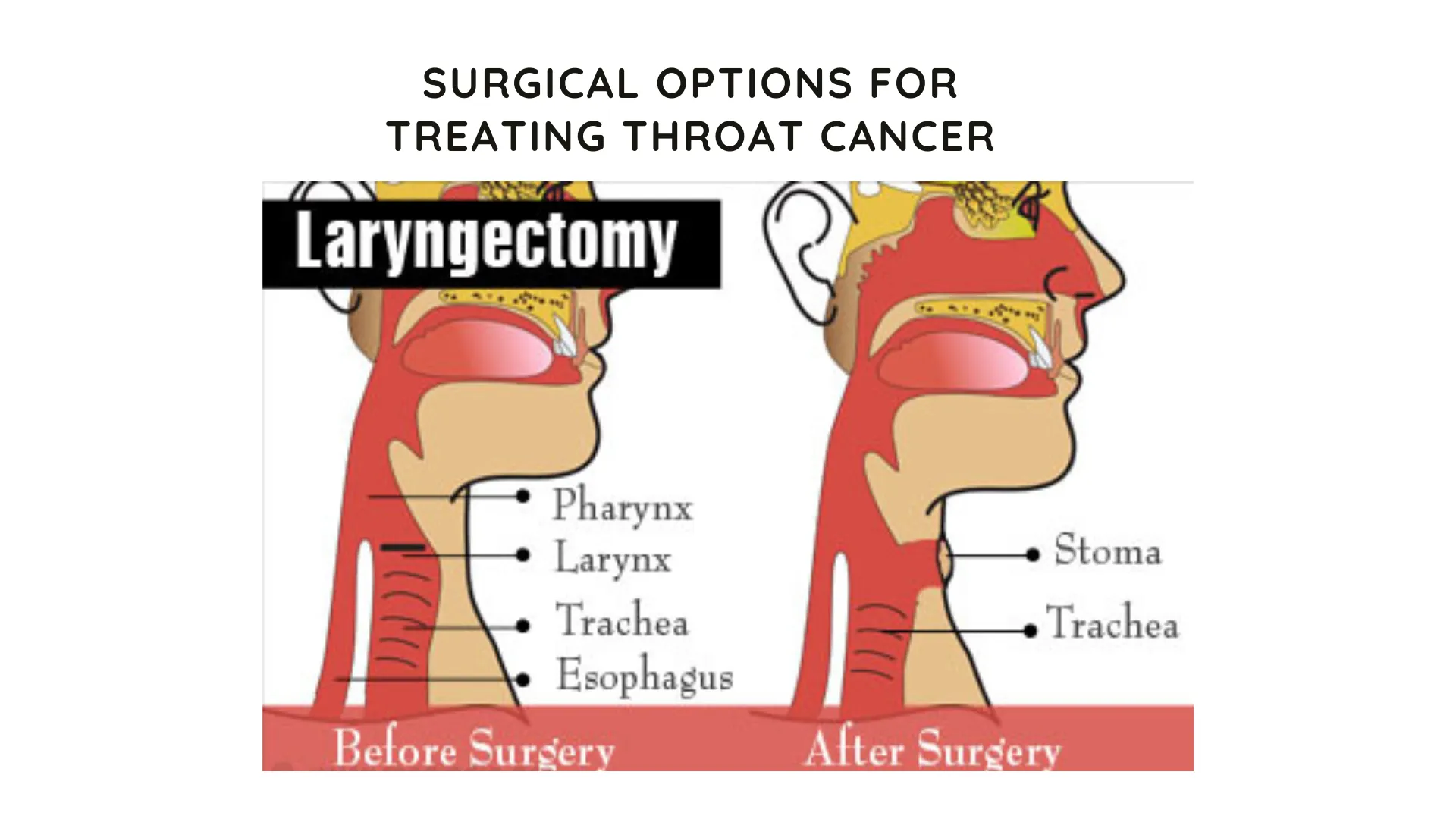A sore throat that doesn’t go away. A voice that sounds hoarse for weeks. A strange discomfort when swallowing that is easy to ignore. These symptoms often seem harmless until they aren’t.
Throat cancer rarely announces itself dramatically in its earliest phase. In first stage throat cancer, symptoms are usually subtle, painless, and easily mistaken for common infections, acid reflux, or voice strain. Because they don’t feel urgent, many people delay seeking medical advice, losing valuable time when treatment is most effective.
Understanding first stage throat cancer symptoms is critical because early detection can dramatically improve outcomes. When throat cancer is identified at Stage 1, treatment is often less intensive, recovery is faster, and vital functions such as speech and swallowing can usually be preserved.
In this article, you will learn the early throat cancer symptoms that should not be ignored, why these signs are often overlooked, and when it is important to consult a specialist for further evaluation so you can take informed, timely action with confidence rather than fear.
What Is Stage 1 Throat Cancer?
Stage 1 throat cancer means:
- The cancer is small
- It is limited to one part of the throat
- It has not spread to lymph nodes or other organs
At this stage, cancer is often highly treatable, sometimes with a single form of therapy such as radiation or minimally invasive surgery.
Common First Stage Throat Cancer Symptoms
Early throat cancer symptoms are usually mild but persistent. The key warning sign is that symptoms do not improve over 2–3 weeks.
1. Persistent Hoarseness or Voice Change
One of the earliest and most commonly overlooked first stage throat cancer symptoms is a persistent change in the voice. This may include hoarseness, a rough or breathy voice, or the feeling that your voice tires easily even without heavy use.
Unlike temporary voice changes caused by a cold or shouting, cancer-related hoarseness typically:
- Lasts more than 2–3 weeks
- Does not fully improve with rest or medication
- Feels unexplained, especially in people without recent infection
Clinically, this happens because early tumours especially in the larynx (voice box) interfere with the normal vibration of the vocal cords, even when the lesion is still very small.
According to the American Cancer Society, laryngeal cancers detected at Stage 1 have a 5-year survival rate of over 85%, largely because voice changes prompt earlier evaluation when acted upon promptly.
The challenge is not the symptom itself but how easily it is dismissed. Many people attribute ongoing hoarseness to aging, acid reflux, allergies, or professional voice use.
While these causes are common, any voice change that persists deserves medical attention, especially when it appears without a clear reason.
Recognising this early sign of stage 1 throat cancer can be the difference between simple, function-preserving treatment and more complex care later on.
2. A Sore Throat That Doesn’t Heal
A sore throat is one of the most familiar and most underestimated health complaints. Yet a persistent sore throat that lingers beyond the usual recovery period can be an important early throat cancer symptom, particularly in first stage throat cancer.
In early cancer, the discomfort is often:
- Mild rather than severe
- Felt on one side more than the other
- Present without fever or signs of infection
- Resistant to antibiotics or home remedies
This happens because an early tumour can cause localized irritation of the throat lining without causing obvious pain or swelling. Since the symptom feels manageable, many people delay further evaluation.
Clinical evidence highlights why this matters. The National Health Service (NHS, UK) advises that a sore throat lasting more than three weeks should always be assessed, as it can be an early indicator of throat or laryngeal cancer when no infection is present.
What makes this symptom particularly tricky is how easily it blends into everyday life. Busy schedules, seasonal infections, or repeated courses of medication can mask the underlying issue, allowing early disease to go unnoticed.
Paying attention to the duration, not just the severity, of a sore throat is a crucial step in throat cancer early detection and one that can lead to timely, less invasive treatment when acted upon early.
3. Difficulty or Discomfort When Swallowing
A subtle but significant first stage throat cancer symptom is difficulty or discomfort while swallowing, medically known as dysphagia. In early stages, this sensation is often vague and easily ignored.
People commonly describe it as:
- A feeling that food is “sticking” in the throat
- Mild pain or irritation when swallowing solids
- Discomfort that is present without obvious choking or weight loss
At stage 1 throat cancer, the tumour is still small, but its location can interfere with the normal movement of muscles involved in swallowing. Because the symptom is mild and inconsistent at first, it’s frequently attributed to acidity, stress, or poor eating habits.
According to the National Cancer Institute (NCI), difficulty swallowing is one of the earliest reported symptoms of cancers of the throat and larynx, often appearing before more visible signs develop.
What is important to understand is that early swallowing discomfort is rarely dramatic. It doesn’t usually stop someone from eating, which is why many people adapt quietly chewing longer, avoiding certain foods, or drinking more water without realising something may be wrong.
Noticing and acting on this early sign of stage one throat cancer can allow diagnosis at a point where treatment is highly effective and normal swallowing function can often be preserved.
4. A Persistent Lump or Sensation in the Throat or Neck
Another important but often misunderstood first stage throat cancer symptom is the sensation of a persistent lump in the throat or the presence of a small, painless swelling in the neck.
In early stages, this may feel like:
- Something is constantly “stuck” in the throat
- A lump that doesn’t move or disappear when swallowing
- A small neck swelling that is not tender and doesn’t reduce over time
This occurs because throat cancers can spread early to nearby lymph nodes or create local tissue changes, even when the primary tumour is still small.
Clinical guidance supports taking this symptom seriously. The American Head and Neck Society states that a neck mass persisting for more than two weeks without signs of infection should be evaluated for possible head and neck cancer.
What makes this symptom deceptive is the absence of pain. Many people associate cancer with discomfort, so a painless lump is often dismissed as harmless. Others assume it is related to dental issues, muscle strain, or minor infections.
However, when a lump or foreign-body sensation persists or gradually worsens, it becomes a key warning sign for early throat cancer symptoms and warrants timely specialist assessment.
5: Unexplained Ear Pain or Referred Discomfort
One of the least expected yet clinically significant 1st stage throat cancer symptoms is unexplained ear pain, especially when the ear itself appears completely normal.
In early throat cancer, ear discomfort often:
- Occurs on one side only
- Comes and goes but does not fully resolve
- Is not associated with hearing loss or ear infection
This happens due to a phenomenon called referred pain. Nerves supplying the throat and larynx also connect to the ear, so early tumours can send pain signals that are felt in the ear rather than at the source.
According to the American Cancer Society, persistent ear pain without an ear-related cause can be an early sign of cancers of the throat and larynx, particularly when accompanied by other subtle symptoms.
Because the pain feels distant from the throat, many people consult for ear treatment alone, delaying further evaluation. When ear pain persists without a clear explanation, it should prompt a closer look at the throat especially in the context of early signs of throat cancer.
Recognising this lesser-known symptom can help catch stage 1 throat cancer before it progresses, when treatment outcomes are most favourable.
Early throat cancer rarely presents with dramatic warning signs. Instead, it whispers through subtle, persistent changes that are easy to dismiss in daily life.
Hoarseness that lingers, a sore throat that doesn’t heal, mild swallowing discomfort, a persistent lump, or unexplained ear pain may all seem minor on their own. Together, they form a pattern that deserves attention.
The key message is simple but powerful: first stage throat cancer symptoms are often mild, but early detection can make treatment more effective, less invasive, and far more likely to preserve essential functions like speech and swallowing.
If you or someone you care for has persistent throat symptoms lasting more than two to three weeks, seeking evaluation from a qualified head and neck specialist can provide clarity and reassurance whether the cause is benign or something that needs timely care.
Listening to your body early isn’t about fear. It is about giving yourself the best chance for recovery, confidence, and long-term quality of life.
Meet Dr. Amit Chakraborty
Head & Neck Cancer Specialist
If something about your throat doesn’t feel right, you don’t need panic.
You need clarity.
Dr. Amit Chakraborty has spent nearly two decades doing exactly that, helping patients move from uncertainty to answers, and from diagnosis to recovery, with care that’s as precise as it is compassionate.
He is trained across India’s leading cancer institutes and the UK.
He is nationally and internationally recognised for complex head-and-neck cancer surgery.
And yes, he is one of the few specialists performing minimally invasive and robotic surgeries that protect what matters most: your voice, swallowing, and quality of life.
Early laryngeal cancer? He treats it with laser precision.
Complex head and neck cancers? He approaches them with experience, teamwork, and calm confidence.
If your symptoms have been lingering for weeks and you are still “waiting it out,” an early consultation will give you peace of mind.
Help Spread Awareness
Early throat cancer symptoms are often subtle and easily missed not because they are rare, but because many people don’t know what to look for.
Sharing accurate, reliable information can help others recognise warning signs sooner and seek timely medical advice.
If you found this article helpful, consider sharing it with family members, friends, or colleagues. A simple conversation or shared resource can encourage someone to pay attention to persistent symptoms and get clarity early.
Being informed empowers better health decisions. By spreading awareness, you help ensure that the people you care about are better prepared to act early, calmly, and confidently when it matters most.
If you have any further questions feel free to reach us. at +91 – 86577 17988 An early conversation is always best when it comes to our health matters.






